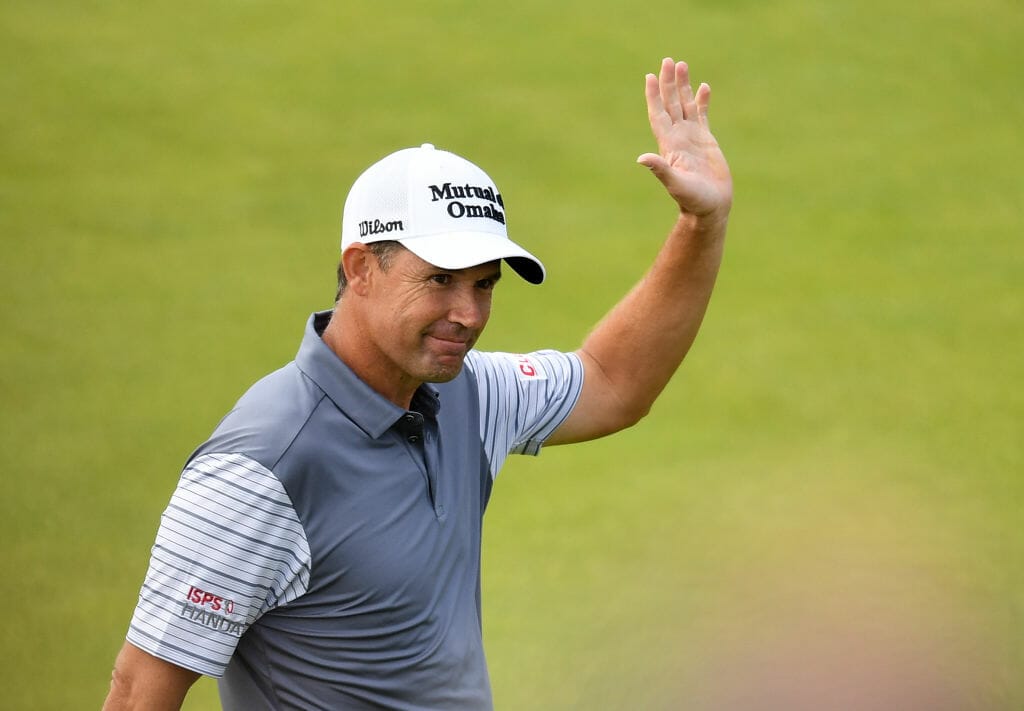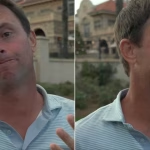We, the Irish sporting public, love Pádraig Harrington as was evident from the reception the three-time Major champion received when he walked onto the set for the Tommy Tiernan Show on RTE One which was screened last Saturday night.
Tommy’s eyes lit up when his MC, Fred Cooke, announced who was to be his first guest. In fairness, it’s a break for the wacky and talented comedian when he actually knows the person who will sit down opposite him to be interviewed.
The format is very different from other chat shows, as Tommy is kept in the dark about the interviewee until they step out from backstage. No chance to do research, formulate questions or pre-judge the person or the situation.
So it had to be a relief and an intriguing opportunity for the show’s host when Pádraig marched out with a big smile to thunderous and sustained applause.
A big name, and one of our own, a model professional, the standard-bearer for all that is good in golf.
To the wider public which has little or no interest in the sport, his achievements, particularly in breaking the glass – or was it cement? – ceiling which kept Irish players out of the inner circle of Major winners for 60 years, were, and are, a source of national pride. Tommy articulated that attitude perfectly when he said he was in Montreal in 2007 on the day Harrington won The Open at Carnoustie.
“You made us all so proud that one of us was winning on a global stage. You became the focal point of what was possible for us as a country.”
And that prompted the reply from Pádraig: “I did break a ceiling. One thing I’m very proud of was the fact that… I actually think back and say how I did it, but I definitely broke a ceiling that the golfers who went before me, and in many ways a lot of sportspeople and things, they didn’t think you could do that from a small country like Ireland.
“I played golf like I’d blinkers on. I didn’t have the burden of what went before me, just because guys hadn’t won tournaments that went before me. I was always competing with myself and fighting with myself. I just didn’t have that pre-judgement of ‘I can’t do it.’
“I didn’t really believe I could do it. I just got in that lovely Nirvana space that I just did.”
Tommy is an astute, empathetic and deceptively insightful interviewer whose brand of humour and direct questions can get behind the outward shell presented by his subjects. Harrington found it different to his usual media interviews.
“Not what I was expecting,” he said with a smile, but the discussion with Tommy went down very well with the public. In recent days much of the social and regular media commentary has highlighted Harrington’s comments on mental health and positive thinking from that interview and how he constantly works on his personality.
There was one aspect that has not received so much publicity or comment: Harrington’s views on something dreaded by sportspeople: “Failure.”
Automatically, the mind recoils from any association with failure. No golfer, hurler, footballer or athlete goes out to fail, but any aspiring sports performer could do well to note the Harrington take on the concept of defeat.
“I see failing as winning,” he said. “I had a career- they used to love to label me with this – I finished second 29 times.
“Up until I won the major in 2007, I had 29 second places, plenty of third places, plenty of fourth places, so they wanted to label me as some sort of loser.
“But every time you fail, you learn something. You learn very little from winning. It can become a good habit, but you don’t learn a lot when you win.
That’s not a bad thing to do, to enjoy it when you win, but you learn massively when you lose because it’s painful.
“But most losses are not the same. Most people want to categorise everything and put them in nice little neat rows, but all my 29 second places, some of them I did great to finish second, some of them I choked and threw it away.
“If you want to win, you’re going to have to put your neck out there and someday it’s going to get chopped off.”
A big learning in that respect arose for Harrington, aged 18, at Dundalk golf club.
“I’d lost a tournament up in Dundalk. I’d bogeyed two of the last three holes. When you’re 18, kids don’t hold back. I was called a choker, I was called all sorts, and I cried in the car park.
“I shed a tear in the car park and it was horrible. As it turned out, I didn’t lose because I was under pressure. I lost because I was relaxed and my sports psychologist (Dr Aidan Moran of UCD) explained that.
“But the fact is that some other people would have felt so bad about losing that they would have never put themselves in that position again, whereas I sought somebody out to help me, and I craved being in that position.
“I’d love nothing better than the next tournament I’m in, coming down the stretch, and having that chance of messing up because that’s the only place you can be if you want to win,” he said.
Harrington will be 49 on August 31. His regular Tour career may be winding down, but the flame of desire to improve and yes, even win again, burns bright. The Ryder Cup captaincy will, of course, make great demands on his time and attention in the coming months.
This gig is a tough challenge for the away team, so Harrington will need all his positive thinking and willingness to make the hard choices at Whistling Straits if Europe are to beat Steve Stricker’s home boys.
No better man, as Tommy Tiernan might say.
























Leave a comment